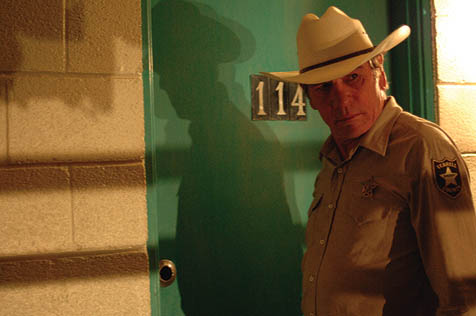Tommy Lee Jones Comes Home to Santa Barbara
The Fugitive Returns

For an actor so rooted in our soil, Tommy Lee Jones is hard to pin down. He much prefers talking about the places he’s visited while making movies rather than discussing the films themselves, as if his interest was landscapes instead of crafted performances.
It’s not totally surprising. Since John Wayne in Monument Valley, Jones in Texas has been the best domestic actor whose craggy features imply American themes. Ask him about No Country for Old Men, and, rather than dish on the Coens or the ambiguities of his role as Sheriff Ed Tom Bell, Jones rhapsodizes thus. “I love working in Texas, West Texas, particularly. Whenever we work there, we lease the same house,” he told me by phone from Florida a few weeks ago. “The people there are my kind of people.”
Of course, he didn’t have such a bad time working in nearby Louisiana either, where he just finished the upcoming film In the Electric Mist for Bertrand Tavernier. “I had a wonderful time in Louisiana. You know, my father was in the oil business, so we traveled down there a lot. It’s very much like home to me. And the people there, well, they’re happy. They’re funny. And they’re polite. Oh, and they love to eat good food. It’s a glorious place.”
It’s not like he’s avoiding the topic of his films, it just seems that Jones seeks some kind of comfort in his artistic world. I asked if his philosophical approach to acting had deepened since he directed The Three Burials of Melquiades Estrada in 2005. “Oh, I don’t know about that; I think I just try to have fun doing it. I mean, at my age, if you’re not having fun, then what’s the point?” He stops and thinks for a moment. “What I try to do is to give the performance I think the director wants. What else is there? When I’m directing, I just sort of assume that’s what the other actors are doing, too. I guess I don’t know if they really are,” he said, sounding a little puzzled.
Jones, who will receive the American Riviera Award at the Lobero Theatre on Friday, February 1, was born in San Saba, Texas, in 1946, the son of an oil man and a beautician/schoolteacher. He attended a private high school, and then went to Harvard on a scholarship where he played offensive tackle, was Al Gore’s roomie, and graduated cum laude as an English literature major, back in the days when it was the best department in the land. Instead of critical theory, Jones loved theater, which took him to New York where he rapidly conquered Broadway, got a regular gig on a popular soap, One Life to Live, and acted in a number of films with megastars like Laurence Olivier and Sally Field.
He first caught fire in Coal Miner’s Daughter, where he displayed for the first time his ability to wrap raw-boned intelligence in a semi-laconic country drawl, evoking a minimalist probity, a philosophic truck-driving man. Often as not, his serious roles explored plain- (or virtually non-) speaking characters in search of a home, from Doolittle in Coal Miner, to Hank Deerfield in In the Valley of Elah-men desperately, quietly trying to restore a balance that’s been driven from the world.
Jones’s next big step balanced him closer to Santa Barbara. (Though he’s been coming here mostly on his polo ponies since the 1980s.) “I directed him three times,” said S.B.-based director Andrew Davis, slightly annoyed that people only remember their third collaboration. “The Package, Under Siege, and The Fugitive,” he elaborated. Davis first saw Jones in the Sally Field film Back Roads. “So I asked [casting] for him in The Package and got him.”

Davis has respect for the mileage on Jones. “He’s an amazing guy, extremely bright, and it’s more when you consider where he came from. He has this reputation for being a tough cookie; people in the press are always asking me, ‘How did you deal with Tommy Lee?'” Davis points out Jones’s flexibility. “He improvised the great parts of Under Siege. None of that stuff was on the page when we got it, so we sat down. He did this whole speech about the ’60s in it, you know where he says he missed the ’60s-‘the ’60s would’ve been better if I’d been there.’ He made that whole thing up. I think he was a little pissed that he had to work so hard in the part, but I also think he stole that film from Seagal.” Truth be told, Jones stole The Fugitive from Harrison Ford, too. “Well, he did win an Academy Award for that,” said a proud Davis.
Davis thinks Jones is misunderstood. “He doesn’t suffer fools, that’s for sure. But he’s also a bit of a dilettante; he plays polo, for God’s sake.” Davis also happily notes the belle lettre-ist lurking beneath the hunk. “I had this script I wanted to do with him, a version of Don Quixote, so I sent it to him and he wouldn’t do it because it cut out so much of the book. He said, ‘You don’t fuck with Cervantes.'”
Tommy Lee, Harvard English lit grad. If you look him up on IMDB, you will “learn” that Jones has the rights to Blood Meridian, the gruesome, Faulkner-meets-James Joyce novel by Cormac McCarthy, who also wrote No Country for Old Men. Not true, says Jones. “You know, you have to take everything you read on IMDB with several grains of salt.” He will admit that he and McCarthy are friends, and that reading the novel should be a savoring experience. “You don’t want to read that novel fast. A little at a time, a few pages, to take in the language,” he said. What is true is that Jones wants very much to make a movie of it. “I wrote a screenplay of the book for Sony, and they have the rights to that book and they have the screenplay.”
So how does somebody write an adaptation of a novel so soaked in blood and yet beautifully poetic? “That’s easy,” said Jones, the plain-spoken literati son of the soil. “You just go through the book and cross out everything that isn’t cinematic.”
Finally, Jones owns a fine, droll sense of humor. Br•ncu i once said that simplicity was complexity resolved, and there are few better ways to do that than in a drawling quip. It seemed to me that after a kind of baroque acting period when Jones did monumentally weird roles like Warden McClusky in Natural Born Killers, Harvey Dent in Batman Forever, and Agent K in Men in Black (okay, that was good), Jones appeared to enter a deeper phase after directing The Three Burials of Melquiades Estrada, adopting a less-is-more style best noticed in Hank Deerfield in In Valley of Elah-for which he was nominated a second Academy Award-and Ed Tom Bell in No Country.
“So you saw that movie?” said the proud Jones of Three Burials. “I’ll tell you right now, it was the most satisfying creative experience of my life.” And why? “Because I got to be the boss. The boss of everything. Even my wife. I talked her into suspending her SAG card and working on that film as still photographer. So for once she had to do what I said. At least during working hours.”
Jones is proud of the recent films, and especially No Country. “The funny thing about it is that I never once worked with either Javier Bardem or James Brolin. We didn’t really meet each other until afterward on the press junkets. Now of course we’re old friends, like Army buddies,” he said. Jones thinks the Coens did a good job adapting McCarthy’s other book and thinks, all things considered, it deserves an Oscar. “It’s got my vote,” he said. And the movie for which he was nominated? “Oh, that’s a good one, too,” he said.
Jones’s literary side will emerge again, as will his joys of being the boss, when he adapts and directs a remake of Ernest Hemingway’s Islands in the Stream. “It was his last book. They made a movie of it in the 1970s, but it wasn’t good. It’s a wonderful book and we’ll see if we can do it justice.”
Meanwhile, he’s between places. “I always say I live in a trailer on a movie set. But I’ve got a home outside of San Antonio, Texas, a place in south Florida, and one in Argentina. I guess I move around because I play polo and raise horses, and I raise cattle, too. Oh yeah, and I’m in the motion picture business, too.”
Tommy Lee Jones doesn’t know what form the tribute will take, but he should be great up onstage. “I don’t know about that,” he said. “But I am looking forward to being in Santa Barbara and catching up with our friends there. It’ll be like coming home.”
4•1•1 Tommy Lee Jones will be presented with the American Riviera Award and chat with Pete Hammond on Friday, February 1, at 8 p.m., in the Arlington Theatre. See sbiff.org.



